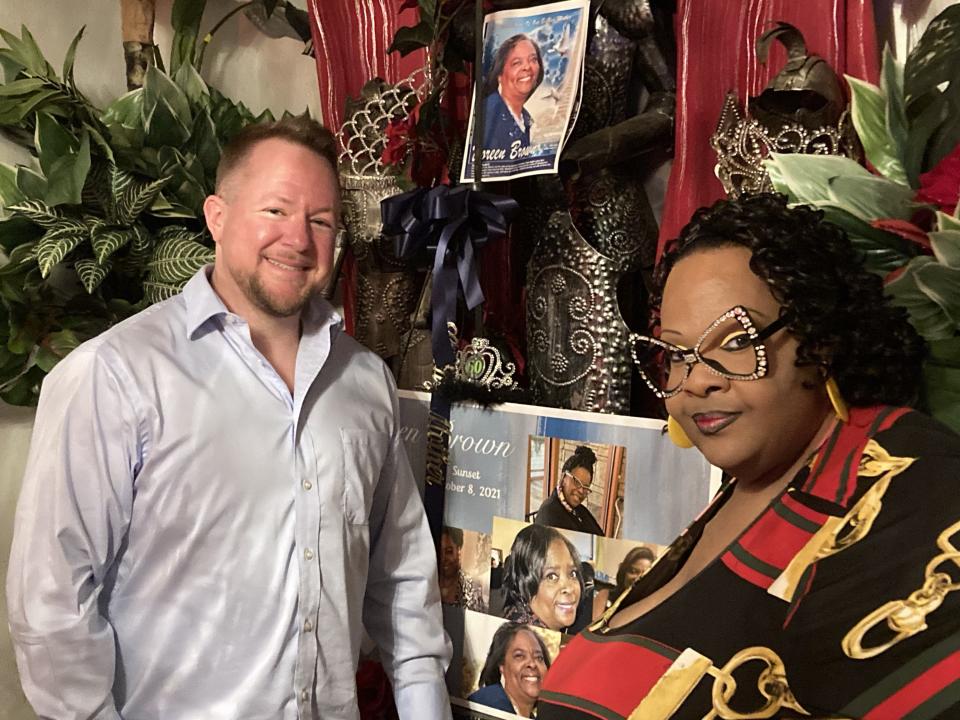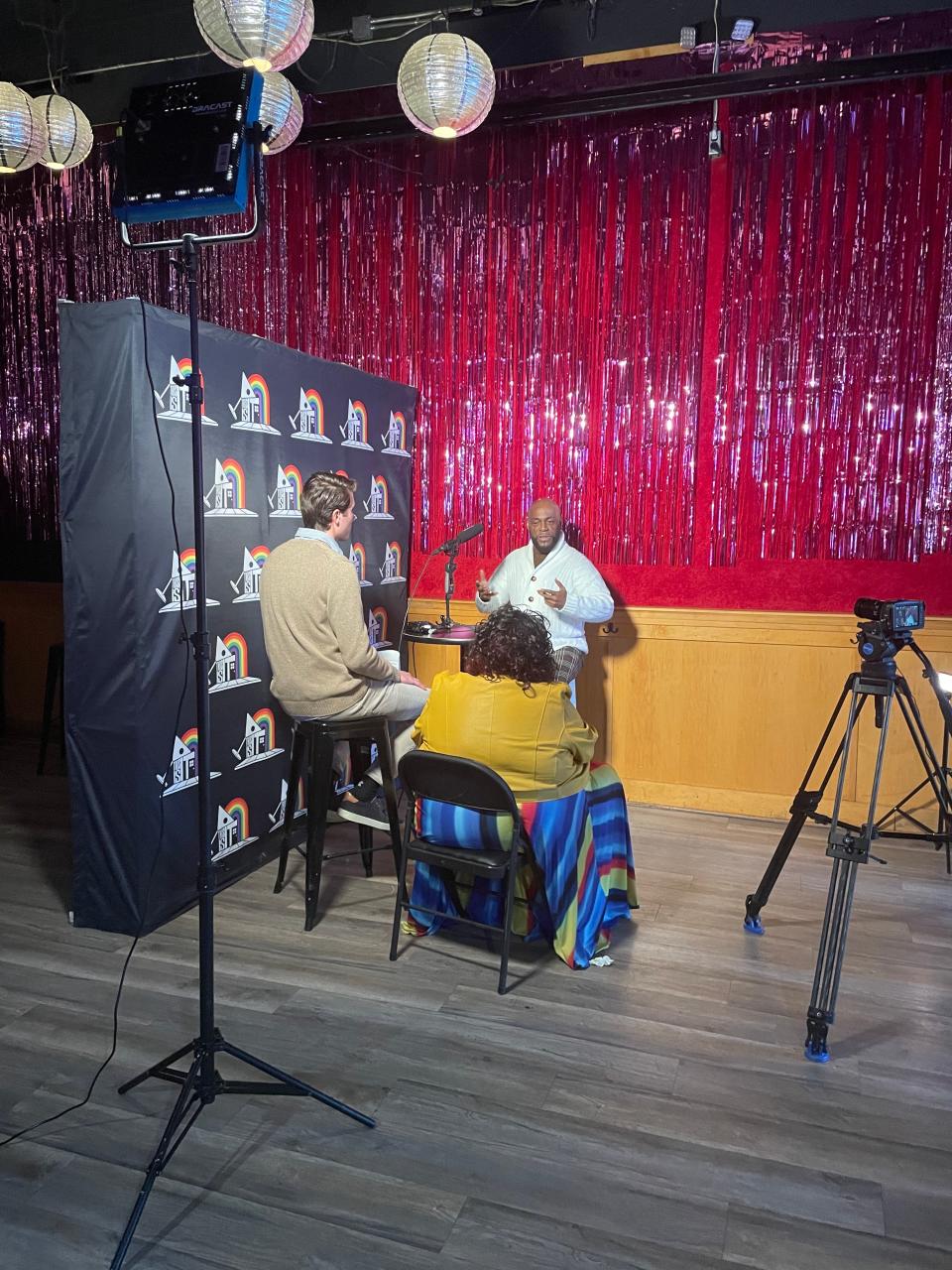Milwaukee's Black LGBTQ+ elders share memories in new 'House of History' project
Editor’s Note: With John Gurda stepping away from regular column writing, the Ideas Lab is teaming with historians, researchers and students to share stories of Milwaukee and Wisconsin often not found in history books. This is especially true for Milwaukee's Black LGBTQ community. An effort is underway to bring this history to light in the House of History project, a website featuring oral history interviews with local Black LGBTQ+ elders that will feature photographs and other historical documents. This is a conversation between its creators: Janice Toy, who performs as Janice Colby, and mentors other trans women and Dr. Brice D. Smith, the executive director of lgbt milWALKee, the organization behind a walking tour app telling the history of local LGBTQ+ people, organizations and events mapped into virtual walking tours. They discuss how the project started and what the public can expect to see when it launches in June. Look for a feature on the project in June on the Ideas Lab pages.
BRICE SMITH: I first met Janice (Toy) while researching the history of SHEBA for the lgbt milWALKee app. The lgbt milWALKee app uses sites around the city to tell our LGBTQ+ history in a compelling multimedia format. Before meeting Janice, my plan was to tell the history of Milwaukee’s Black women of trans experience through the history of the support group SHEBA, which Janice has been affiliated with since its inception back in the 1990s. But it quickly became apparent how little history was known about all Black LGBTQ+ Milwaukeeans. Janice and I clicked right away and I asked her if she’d be willing to help me record and share this history.
JANICE TOY: I wanted to be a part of this project so that the many Black individuals’ life work don’t go unnoticed. And that their memories stay alive. And it also teaches other up-and-coming individuals that you are not alone. And it makes you appreciate that we of Black gay descent have always been around. And because of some of these great individuals a lot of movements and rights and acceptance is because of them. Because of them we were given the right to sit at many of these tables that a lot of young gay individuals take for granted. I, alongside with Brice who is the one who made all this possible, saw a need of inclusion. And I’m thankful. Because of him seeing the need and lack of information we are here being able to share our stories with others and others to come.
Brice: Janice is one of the classiest ladies I’ve ever met. She gives me way too much credit. Truth is we white LGBTQ+ historians have done a lousy job of being racially inclusive, both in terms of whose stories we tell and who tells the stories. Being inclusive means being a good historian and a decent human being. I just helped provide the resources for Black LGBTQ+ elders to tell their stories. The project was funded by a grant from the Greater Milwaukee Foundation and is sponsored by the Cream City Foundation. We’ve been able to involve students from Milwaukee School of Engineering, the University of Wisconsin-Milwaukee, The Milwaukee Institute of Art & Design, and St. Olaf College in helpful and creative ways. This Is It, the oldest, continually-operating LGBTQ+ bar in the state, graciously allowed us to conduct several interviews onsite. And the interviewees entrusted us with their stories.

Janice: When picking individuals to interview, I tried to pick an arrangement of people in the Black LGBT community that was seasoned (over 40), that could tell they experience, and not just from a woman of trans experience such as myself but of all the different Black LGBT paths. For me, being on the other side of the table asking questions, I too was able to learn of the many stories of what it was like before many of the rights and laws that we have now. As well as how far we have come in the fight for inclusion and for the right of acceptance. What many had to go through before a lot of the clinics and programs was available. Stories of survival and how they got through many of those dark paths.
Brice: Our interviewees have navigated lives filled with racism, homophobia and/or transphobia at every turn. They’ve been discriminated against by the LGBTQ+ community, ostracized by the Black community and barely acknowledged by the mainstream. Their mere survival is remarkable. But these incredible human beings also share hope, wisdom and inspiration. When I first met Janice and she told me her story, it inspired this entire project. If just one story could do that, imagine what ten more might do! We’ve conducted eleven interviews for the project, and it simultaneously feels like the project is complete and just getting started. The interviews have great breadth and depth. The interviewees have diverse identities, ages and experiences. But their stories are just the tip of the iceberg. There remains so much Black LGBTQ+ history to recover, document and share.

Janice: What I think this project would mean to Black LGBT Milwaukeeans would be a sense of finally being given a voice and recognition of the hard work many have done but we as a community never heard of.
Brice: And I hope it saves Black LGBTQ+ Milwaukeeans’ lives. One of our interviewees, Dynasty, was friends with “Deaf Tony” Hughes, who was murdered by Jeffrey Dahmer. They rode the bus together from their Black neighborhoods to the gay bars. James, another interviewee, gave up performing drag and became a long-time MPS teacher. One of the many LGBTQ+ students to come under his care was Mya Allen, who became one of three Black trans women murdered in Milwaukee in 2022 alone. These individuals were invaluable to those who knew and loved them. If more people can know more people like them, or at least hear their stories, we’d realize we can’t afford to lose them.
Janice: Before this project my thoughts of history was a feeling of a need to be included. So many of the great individuals I looked up to and who had paved the way for me—their voice was lost when they died. And some of the ones that looked up to them, as I did, have lost their lives as well. So many of the stories have died along with them. And when you think of history you want to feel included as a whole. This is my first time working on a project like this. My voice is being heard as well as my version of what I experienced growing up black gay and trans.
This article originally appeared on Milwaukee Journal Sentinel: Janice Colby shares story of growing up Black, gay and trans in Milwaukee

